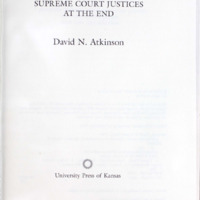-
Title
-
Leaving the bench : Supreme Court justices at the end
-
Description
-
Life appointments make Supreme Court justices among the most powerful officials in government and allow even dysfunctional judges to stay on long after they should have departed. For that reason, when a justice leaves the bench is often as controversial as when he's appointed. This first comprehensive historical treatment of their deaths, resignations, and retirements explains when and why justices do step down. It considers the diverse circumstances under which they leave office and clarifies why they often are reluctant to, showing how factors like pensions, party loyalty, or personal pride come into play. It also relates physical ailments to mental faculties, offering examples of how a justice's disability sometimes affects Court decisions.--BOOK JACKET."Ultimately, Atkinson shows just how human these people are and enhances our understanding of how the Court conducts its business. He also suggests specific ways to improve the present situation, weighing the pros and cons of mandatory retirement and calling for reform in the delegation of duties to law clerks - who in recent years have dominated the actual writing of many justices' decisions."--BOOK JACKET."As the current Court ages, how long might we expect justices to remain on the bench? Because our next president will likely make several appointments, now is the time to consider what shape the Supreme Court will take in the next century. Offering a wealth of information never before collected, Leaving the Bench provides substantial grist for that debate and will serve as an unimpeachable reference on the Court."--BOOK JACKET.
-
Identifier
-
880533
-
700609466
-
Creator
-
Atkinson, David N
-
Source
-
Brian Lamb Booknotes Collection
-
Gift of Brian Lamb, 2011.
-
Catalog record
-
Language
-
eng
-
Date
-
1999
-
Program air date: August 22, 1999
-
Publisher
-
University Press of Kansas
-
George Mason University. Libraries. Special Collections & Archives
-
Text
-
Transcription of Annotations
Notes on front endpapers and back free endpaper: Unless changes pessimistic about court. John Marshall 34 yrs, 5 mos. Roger Taney 28 years. South never created a S.C. 2. Goldberg 4th Justice this century to leave court for other positions; 1. C.E. Hughes--Pres. run; 2. James Byrnes--asst. Pres.; 3. John Clarke--work for world peace. Fri. July 23. Crystallized intelligence, fluid intelligence. Justice Grier--1st to be forced from Bench by his colleagues p 183. No justice has died in office 1954, riding the circuit. 7 Justices buried in KY. No Justices attended McReynolds funeral. John McLean--would sleep on bench (1861) p 38. Benjamin Curtis--returned to law--around 54 cases before S.C., defended Andrew Johnson. Joseph Story--can see no hope for this country p 33. Henry Baldwin--crazy--jumps up and down in stocking feet p 33. Robert C. Grier--1st justice forced from court p 48, his daughters didn't want to leave. Author interviewed W.O. Douglas, 1968; Hugo Black, 1968; Byron White, 1996. Notes/Underlinings: Lamb underscores sections of chapter/appendix titles on the Contents page. Idea behind book, sources, health, reasons for resignations/retirement; reasons they remain on bench. Funerals. Details on lives, careers of Justices, their time on the court, challenge of riding circuits, political ploys, conduct.
-
Subject
-
"United States. Supreme Court--Biography."
-
"Judges--United States--Biography."
-
"Judges--United States--Retirement."
-
Relation
-
Original Booknotes interview
-
Rights
-
This work may be protected by copyright laws and is provided for educational and research purposes only. Any infringing use may be subject to disciplinary action and/or civil or criminal liability as provided by law. If you believe that you are the rights-holder and object to Mason’s use of this image, please contact speccoll@gmu.edu.
 880533.pdf
880533.pdf